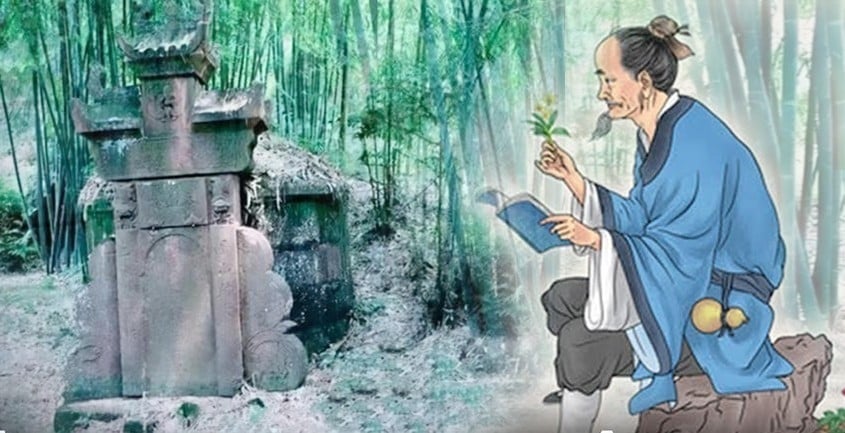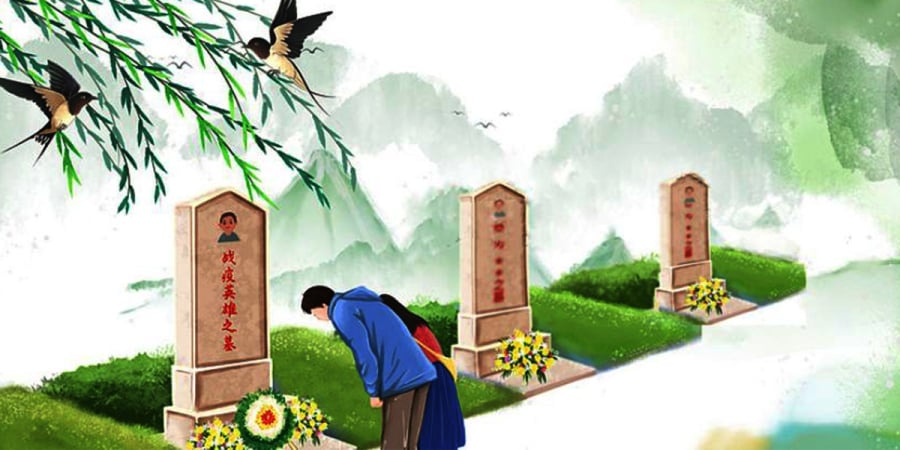In Vietnamese culture, paying respects to one’s ancestors is a significant ritual that demonstrates piety and gratitude towards one’s roots. However, there are many superstitions surrounding this practice, one of which is the saying, “When visiting a tomb, don’t bring three people, and don’t stay past the hour of Mùi.”

‘Don’t Bring Three People to a Tomb, and Don’t Stay Past the Hour of Mùi’
1. Why Shouldn’t Three People Visit a Tomb Together?
According to Feng Shui and spiritual beliefs, there are three groups of people who are usually advised against visiting tombs, especially on important occasions such as Thanh Minh or death anniversaries:
-
Pregnant women: Pregnant women are believed to have lower immunity and are more susceptible to negative energy at cemeteries. Moreover, tomb visits can potentially affect the fetus due to the unstable energy balance between yin and yang.
-
Children: Children, especially toddlers, have fragile bodies and are easily influenced by surrounding energy fields. Folk beliefs suggest that children lack the ability to protect themselves from spiritual influences, hence the advice to avoid activities related to gravesites.
-
Individuals with poor health or recovering from illness: People with weak health or those who have recently recovered from sickness typically have low yang energy and are more vulnerable to yin influences. Visiting a tomb may leave them feeling exhausted, prone to catching a cold, or encountering misfortune due to negative spiritual influences.
These three groups are usually advised against visiting tombs to ensure their well-being and avoid any adverse spiritual impacts.
2. Why Shouldn’t One Stay Past the Hour of Mùi When Visiting a Tomb?
In the Can Chi time system used by East Asian cultures, the hour of Mùi refers to the time between 1 PM and 3 PM. This period is also considered significant in relation to the spiritual realm:
-
Hour of Mùi and Yin-Yang Balance: In Feng Shui, the afternoon hours from 1 PM to 3 PM mark the decline of yang energy and the rise of yin energy. Visiting a tomb during this time can intensify the interplay between yin and yang, leading to unfavorable consequences for the living, such as exposure to negative spiritual influences or energy.
-
Impact on Health: As the sun sets in the afternoon, the human body tends to feel fatigued, and yang energy diminishes. This reduction in vitality weakens the immune system, making individuals more susceptible to environmental influences, especially in cemeteries, which are imbued with yin energy. Hence, visiting a tomb during the hour of Mùi may have adverse effects on one’s health.
-
Respecting the Resting Hours of the Deceased: Another explanation suggests that after the hour of Ngọ (noon), the spirits of the deceased begin their resting period. Visiting a tomb past the hour of Mùi could disturb their peace and affect their repose, which is considered disrespectful to both the living and the dead.

Why Shouldn’t One Stay Past the Hour of Mùi When Visiting a Tomb?
The saying, “When visiting a tomb, don’t bring three people, and don’t stay past the hour of Mùi,” reflects the deep-rooted spiritual and Feng Shui beliefs of the Vietnamese people. While these beliefs may not be scientifically proven, they hold immense spiritual value, showcasing reverence for the deceased and caution in traditional rituals.
Adhering to these superstitions not only provides peace of mind but also demonstrates piety and respect for family traditions and cultural heritage.
The Bed Placement That Attracts Wealth and Wellbeing: A Guide to Feng Shui Your Bedroom
In the world of Feng Shui, there is a strong belief that the placement of your bed can have a profound impact on your wealth and prosperity. It is said that positioning your bed in certain directions can lead to financial losses and hardships. Thus, it is crucial to avoid placing your bed in this detrimental orientation to prevent any undesirable consequences.
The Ultimate Guide to Wealth and Prosperity: Unlocking the Secrets of Fortune with Three Magical Trees
“Unveiling the Trio of Fortune: Trees to Embellish Your Home’s Prosperity and Luck
There are three types of trees that homeowners should consider planting in front of their houses to attract wealth, prosperity, and an abundance of blessings for generations to come. These trees are not just aesthetically pleasing but are believed to hold symbolic value, bringing good fortune and a prosperous future to those who embrace their presence.”
The Superstitions of the Ghost Month: A Guide to Attracting Luck and Fortune During this Auspicious Time

The ancient practice of placing feng shui water features in the right spots has proven to bring immense wealth, prosperity, and good fortune to homeowners.













